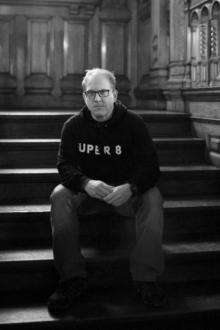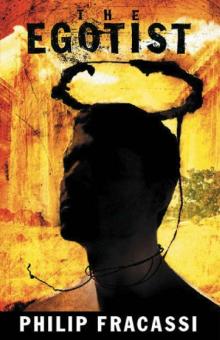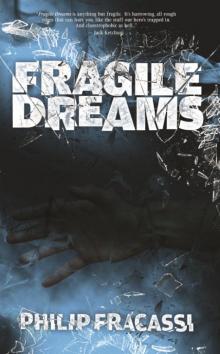- Home
- Philip Fracassi
The Egotist Page 13
The Egotist Read online
Page 13
I have better things to do, I don’t know why I concoct such things. But I will finish what I have started, and the plan begins today. I will sit by the phone, and when it rings, I will not answer it. In the meantime, I have other things to consider and other plots to unfold. Now that I have money, none of them should pose too much difficulty.
I’ll miss Marie very much, and I hope to soon, as soon as feasible, to replace her existence with any ten-dollar whore I can find.
Conversations and Loneliness
Can I just tell you something? Let me tell you something, so that you really understand it. I want you to really understand it well. Are you listening? Am I talking here? Is there anyone reading this dribble, because if there is, I want you to remember what I’m about to tell you - every word.
Life is not a comedy, or a sitcom, or a situation. Life is not a conversation, or even a chat. It’s not filled with two heads bobbing and tongues waggling, spewing nonsense in a circular formation while other heads bob and other tongues wag so that it’s just one big world filled with horrible noise. That is not life. That is not what you have been put on this planet to accomplish. And I’ll tell you another thing: there are much better things to do with your time than to sit in front of some stone-faced ignoramus and tell him or her all about the things that are in your ficticious head. I call it a ficticious head because it is impossible for anyone to ever speak the real truth, to tell the real story.
Everything that is honest must be written out on paper, with no one else around, and when you’re writing it you must think, you must know the words that you are writing will never be read by another living soul. Because if you think that they will be than you are cursed once more, and you become nothing but a spewer of lies and fiction.
In books and movies you see people moving about from situation to situation, speaking and conversing and acting and re-acting. In life, it is not so. You will be alone and say very little. You will be spending most of your time in thought, in reflection. You will have spurts of conversation, surely, but nothing like what you think it is. If you have conversation often, then you are desperate and searching. You fear yourself and your intimate surroundings. If you are not afraid to be alone, you will not seek out this traditional form of companionship, and you will sit in cool, darkened rooms, and you will ponder great thoughts, and write down honest ideas.
The lonely person is the strongest person. If that person also has social graces, then that person is all the better off, because now he or she can think great thoughts, and spew great lies, without confusing the two things. There are many people who get very confused. They go to school and are taught how to replace their own powerful, lonely thoughts with verbiage, conversation and useless, inane rhetoric. These people go through life, leaping from one folly to the next, thinking that they are learning, and growing, and becoming more knowledgeable. But I tell you this: you can only learn from yourself. If you will not listen to your own voice, then you will never learn anything from listening to another’s.
See? You must be lonely. Not all the time, but most of the time. Beware of marriage, for it steals one’s soul and captures one’s mind. Two minds do not think better than one, that is poppycock and a lie. One mind thinks the greatest of all, and time spent developing the thoughts of one mind is time spent very well.
Now, this isn’t to say you shouldn’t interact with other humans. As I said before, reflection is something that should be done not all of the time, but most of the time. If you do not learn how to interact with society, as demented as it is, you will be nothing but a sad, confused and hapless individual. You must seek out and explore the different possibilities around you before you can begin to ponder them, to ponder how wrong so many things are done. Do not shield yourself from the world, indulge it. Mock it. Learn from its mistakes. Then, when you are old enough, you will be the one who works on correcting those errors, on producing good instead of bad.
Write down your musings, explore yourself and your own character. Do not hide yourself away like some of these other self-proclaimed “minds,” but keep living until they pry your cold, dead fingers from the wheel of life. Keep pushing things around and making them different. Destroy things, rebuild them. Kill things, then make more. Hide things, to show you won’t miss them. Defy things and be sure to keep score. You cannot build joy upon happiness, nor honesty upon truth. You must create your own happiness by spending your life destroying so many others, and you must consider yourself honest only once you have mastered the lie.
Take heed of little things. Keep your head up. Destroy anything that stands in your way. Never be beaten. Never surrender.
The Tango
I sit in my apartment and listen to the melodies of Tchaikovsky’s Swan Lake and ponder the events of the evening. I feel somewhat powerless, as if drained of all will. My anger, the strength of it, is dwindled and weak. I feel little strength in my arms, and I try and lift them off of the table as I write, and the strain to hold them aloft is obvious. I feel so old, even pushing this pencil is straining me. Maybe tonight aged me, like that movie where those teenagers are in the bodies of old people, but opposite. Perhaps my insides are old while I carry on the fresh exterior of a youth. It certainly feels that way.
I suppose I could transcribe the events, but I fear it would even further deplete my resources which are already used to the hilt. However, behind me the Introduction of Swan Lake is stirring, and it propels me to find the energy. I ask that you find your own collection of Tchaikovsky, and put in Swan Lake, and listen to the Introduction and First Act as I tell you this story:
Lemus’ new truck still smelled new, the leather interior giving off the rich pungency that only new car leather can give. It was a well-oiled beast of a thing, his truck, and it purred with authority as it idled. I slid into the open passenger door and sank down into the seat like a traveler in the plushest of cockpits, feeling the thing vibrate around me, excited by my weight.
“You like?” Lemus asked.
“It’s very nice, Lemus. Can you drive over things?”
Lemus proceeded to demonstrate that he could in fact drive over things by doing a U-turn over the median which divides one side of my street from the other.
“Where we headed?” he asked, excited for the evening to come. I, myself, did not share in his enthusiasm. A dark cloud of funk had settled over me, affecting my aroma. I felt short of breath and a little queasy, and the vibes I was giving and getting from the night were not reassuring.
“Let’s get John Liggins,” I said, thinking that he might be just the trick to float me out of this stormy temper.
“Good enough,” he said joyously, propelling his growling bear down the well-lit avenue, the lights dancing on the clean glass of the windshield.
“Here, you call him, tell him to get ready,” he said, grabbing something from the dark crotch of the truck’s cockpit.
He handed me a cell phone, and I almost gasped. I was not ready for it. I felt suddenly plastic. I can’t explain why.
I used the strange device to call Liggins and found myself slightly impressed when a ringing came to me from the other end. It rang a few times, and then John Liggins’ machine picked up. I handed the phone back to Lemus, who looked at me strangely.
“What?” he said.
“He’s not there.”
“Well, you’ve got to hang it up.” He pressed a button or two on the phone, then replaced it into what I now saw was a cradle hidden beside his seat. I felt very intimidated suddenly, and flushed at the thought. I badly wanted to be out of the truck, and found myself searching for the window control.
“It’s that button there, just press it,” Lemus said, eyeing me as I searched for the traditional roller-handle found in most cars I had driven and ridden in. I felt even more abashed than before, but pressed the button and watched the glass slide gracefully down into the door.
I stick my elbow out the window and feel much better as warm night air rushes into my face.
>
“So now what?” Lemus asks.
I ponder for a second, then decide on a coarse of action.
“Now we go to John Liggins’ house,” I say with certainty.
“Why? You said he’s not home.”
“Because, Lemus,” I find myself pronouncing his name with sudden contempt, “I told you to.”
I say it rudely, condescendingly, but feel the old rush come through me, and zesty suddenly describes me.
I look out the window and ignore whatever befuddled look he may be offering. Harder than I should, I slap the outside door paneling of the truck.
“Can’t this heap go any faster? How much did you pay for this gas-guzzler, anyway?” I say loudly into the wind, feeling better with every syllable. I re-establish my place in the universe and will continue to do so and to remember who I am. I am W. Buhner, and I am alone. I am the One.
I sense Lemus’ apprehension, and with another slap of the truck I turn to him, my features blazing.
“C’mon, Lemus, it’s time to do something bad!” I scream, jarring him nearly out of his leather-bound seat. He nods, recovering shakily, his attention back to the road. I laugh and slap him on the shoulder, turn on his stereo, insult his music, and smile as the warm air blows through me.
We arrive in front of John Liggins’ house and I notice there are lights on all over the place. I think bitterly that, for his sake, he better have just gotten home, for, if not, I was going to rip through him like a tornado for making me speak with the answering machine. I get out of the truck and approach the front door, leaving Lemus to stay put and watch his precious ride.
I hop onto the small porch and am just about to knock when I hear music from inside.
Now, this is where the night takes a turn.
The music, I realize, is not rock ‘n’ roll. It’s not Classical, Soul, Rap, R&B, Punk, or Pop. It’s not Daryl Hall or John Oates, it’s not Rick Springfield or Carly Simon, not U2 (thank God), R.E.M., Buffalo Springfield, the Ramones or the Replacements. What it is, I come to realize, is . . . the Tango. The Tango. I stop dead in my tracks, lower my head, and just listen for a few moments. Yes, it’s the Tango, all right. The goddamned Tango . . .
I look out toward the street and see Lemus, sitting patiently and obediently in his shiny new truck. I give him an index finger, telling him to wait a minute, and move off the front porch. I know something is amiss, and knocking on the front door while your drinking buddy is blaring the Tango is the equivalent of chomping down on a peanut butter and jelly sandwich when you’ve just noticed what could be a piece of green fuzzy mold on the crust of your bread. You just have to pause and clarify a few things before moving forward.
I move around to the front window of John Liggins’ home. I know that the large window facing the street looks through the dining room and into the main living room area. There are blinds covering the window, but they are not closed flat, and I can easily get my point of vision widdled between their slits.
Inside, I see the dining room table. Specifically, the back of one of his dining room chairs. I move over to another slot a few feet over, stepping on some sort of flower or other such thing in the dirt at my feet, and look through once more. And it is here, ladies and gentlemen, where my world came suddenly into harsh, clear focus.
Standing there, or, shall I say, dancing there, doing the Tango, are John Liggins and my beloved sister, Beth. I watch in amazement as John Liggins and Beth dance an awkward Tango, back and forth across the living room floor, their missteps bringing giggles and teasy, trite little smiles to their small, pesky faces.
Conniving bitch! I scream in my mind, and feel a pulsing heat push itself onto my forehead. I step on a couple more flowers to get a better view of the goings-on, and suddenly wish that I hadn’t.
Blind me now, for I wish I could not see what was in the room this night. For here, right in front of me, they are kissing. Abrupt, breathless kissing. And they dance as they kiss, and there are candles burning, and I see wine open on a nearby table, and the Tango is still playing, over and over again it is playing, and I suddenly lurch myself away from the window, sprawling backwards over the lawn. I feel unexpected nausea, and my hand leaps to my stomach. Breathing rapidly, I stand up straight, my mind racing. Spurting and roaring and raging is the blood in my brain, and I slowly make the conscious decision to relinquish control . . . and let the other half take over.
I step out of my body, rising softly above it to watch as the fire burns. My body paces back and forth madly across the lawn, kicking at clumps of grass and cursing, eyes bulging, and my body is forced to wipe at my mouth because I can feel saliva coming down my chin. But drooling is not the worst of it, for this mad dog is having its day right here on the front lawn of his best friend’s home, and a damned dastardly day it is going to be.
I leave my conscience well clear of any actions that are going to follow. It has no right to be here, and I don’t want it interfering. A black will settles into me, my heart shrivels to the size of a wet pea, and my body tenses into a tight wad of coursing, surging, filthy, blinding wrath.
Fury takes movement, and to the front door it goes. With one massive kick, I send the door in on its hinges, ignoring the splintering fragments of wood that sting my face. Charging inward, I hear muted shouts of surprise. I ignore the shouts, and ignore the people inside as well, knowing that to address them is to commit murder. Instead, I move to the stereo, and without pause, kick the living brains out of it, sending pieces of it and the Tango flying everywhere. I grab the bottle of wine off of the table next to me and throw it violently across the room, watching only peripherally as it shatters in a splash of artistic red across the stucco wall.
There are more screams now, and the rough hands of John Liggins grab my shoulders. I ignore them, and suddenly see Lemus, who is making it a habit to back me up during fights, come charging through the door and, brushing past my shoulder, into the obstructing body. The hands are now gone from my shoulders, and I am free to tear rain down from the skies once more.
Surging, I grab anything in site. The end of the couch I lift and hurl over like a Raggedy Ann doll, the coffee table gets sent sprawling, glasses and magazines are sent spiraling across the hardwood floor. I hear a struggle from behind me and look about for something else to destroy. I keep my eyes off anything living, aiming my vision mostly toward the floor. I think about trying to light the place on fire, but my tempest has not the patience for such coordination, and I instead swipe a trio of burning wax candles off of a nearby shelf, and with one powerful downward blow, send the shelf to the floor as well. Somehow, a chain reaction of sorts has begun, and I watch the tumbling of two other shelves, filled with books and pottery, crash to the floor in a rumble.
I feel my energy waning and walk abruptly toward the front door, sending a few dining room chairs toppling over in my wake. When I reach the door, I do not turn around, but I speak just above a whisper. Now that the destruction has stopped, the room has become stink quiet as my words permeate.
“If I see either of you again . . .” and, without the energy to complete the ragged threat, I turn around and pass my eyes over the mess. I glance over John, thinking little, and let my eyes wander to Beth. Her eyes are lit up in flaring rage, and it breaks my momentum for only a moment. I steady myself and return her hateful stare.
“He’s all yours now, Beth. I’m through with him.” I don’t look back at John, I don’t think I can. I turn away. I walk out of the house.
I get into the driver’s side door of the truck to find it still running. I put it into drive, and hear a pounding on the passenger side door as I begin to go into motion. I turn, swearing to destroy whatever I see, only to find a panicked and white-faced Lemus. I hit the brake, he hops in, and I grunt sullenly before flooring the accelerator.
“Can it run things over?” I say hysterically, in a voice even I barely recognize, and turn the wheel toward John Liggins’ home.
I feel us bounce over the curb, gunning
for the front of the house. Lemus screams a protest from beside me. At the end, restraint takes over, and I throw the wheel to the right, swallowing turf with the giant tires, only to hurl the tail of the spiraling machine against the front of the broken little house. The bumper slams against the wooden porch and splinters fly through my rear view vision.
I turn the truck back toward the street, bounce over the curb, and drive away from the scene at a solid clip. About twenty minutes later and nowhere near home, after an extended silence broken only by moans from my passenger, I pull over and get out of the truck, walk briskly away.
There are words coming from behind me, but I hear little as I walk through the streets of midnight, wandering in a blank world with nothing at all on my mind.
Eventually, I find my way toward home and arrive at my own door hours later. Astonishingly, I am not at all tired, and set myself down at my table and try not to think about the evening’s events.
I feel as if I’ve just woken from a dream, and I wonder if what I dreamed really did happen.
BOOK ELEVEN
REVENGE
Intellectually Servile
John Liggins is a stupid man, I decide. Two days after I trash his home, he doesn’t even have the pride to come over here and do an equal job on my own place. He should have been over the next morning pounding on my door, curses flaring like fire from his mouth.
He gives me nothing.
What do I get? Two days after the fateful evening? A letter. A letter slipped under my door, and it’s all written in lawyer-talk.
(Following is a copy of the letter from John Liggins to W. Buhner. It was found within the same book as the current writings. In order to protect the interest of the individual, the address, including city and state, have been omitted.)
June 16, 199_

 Behold the Void
Behold the Void Sacculina
Sacculina The Egotist
The Egotist Fragile Dreams
Fragile Dreams Altar
Altar